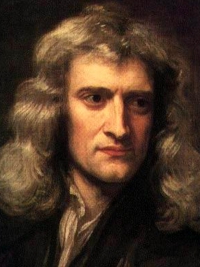Lifetime
Born: 25.12.1642, Woolsthorpe-by-Colsterworth LincolnshirePassed away: 24.03.1727, Kensington, Middlesex, England
About
Sir Isaac Newton PRS (25 December 1642 – 20 March 1727 [NS: 4 January 1643 – 31 March 1727]) was an English physicist, mathematician, astronomer, natural philosopher, alchemist, and theologian, has been "considered by many to be the greatest and most influential scientist who ever lived."
His monograph Philosophiæ Naturalis Principia Mathematica, published in 1687, lays the foundations for most of classical mechanics. In this work, Newton described universal gravitation and the three laws of motion, which dominated the scientific view of the physical universe for the next three centuries. Newton showed that the motions of objects on Earth and of celestial bodies are governed by the same set of natural laws, by demonstrating the consistency between Kepler's laws of planetary motion and his theory of gravitation, thus removing the last doubts about heliocentrism and advancing the Scientific Revolution. The Principia is generally considered to be one of the most important scientific books ever written.
Newton built the first practical reflecting telescope and developed a theory of colour based on the observation that a prism decomposes white light into the many colours that form the visible spectrum. He also formulated an empirical law of cooling and studied the speed of sound.
In mathematics, Newton shares the credit with Gottfried Leibniz for the development of differential and integral calculus. He also demonstrated the generalised binomial theorem, developed Newton's method for approximating the roots of a function, and contributed to the study of power series.
Newton was also highly religious. He was an unorthodox Christian, and wrote more on Biblical hermeneutics and occult studies than on science and mathematics, the subjects he is mainly associated with. Newton secretly rejected Trinitarianism, fearing to be accused of refusing holy orders.
- Wikipedia
